#studying grammar
Text
接続詞(せつぞくし)
conjunctions - words that are used to link phrases together
情報を加える // Adding information:
しかも besides
そのうえ moreover, on top of that
さらに moreover, on top of that
そればかりか not only that, but also...
そればかりでなく not only that, but also...
情報を対比する // Putting into contrast:
それに対して in contrast
一方 whereas
他の可能性・選択肢を言う // Giving alternatives:
あるいは or perhaps (presenting another possibility)
それとも or (presenting another option within a question)
結論を出す// Drawing a conclusion:
そのため for that reason
したがって therefore
そこで for that reason (I went ahead and did...)
すると thereupon (having done that triggered sth. to happen)
このように with this (adjusting a conclusion to the arguments given beforehand)
こうして in this way
理由を言う // Giving a reason:
なぜなら...からだ the reason is
というのは...からだ the reason is
逆説を表現する // Expressing a contradiction:
だが however, yet, nevertheless (contradicting what one would have expected)
ところが even so (spilling a surprising truth)
それなのに despite this, still
それでも but still (despite a certain fact, nothing changes)
説明を補う // Amending one's explanation:
つまり that is, in other words (saying the same thing using different words)
いわば so to speak (making a comparison)
要するに to sum up, in short
説明を修正する // Revising one's explanation:
ただし however (adding an exception to the information stated beforehand)
ただ only, however
もっとも however (obviating any expectations that might arise through the previous statement)
なお in addition, note that (adding supplementary information)
話題を変える // Changing the subject:
さて well, now, then (common in business letters after the introductory sentence; is often ignored in tranlations)
ところで by the way
#文法#grammar#conjunctions#japanese grammar#jlpt n2#japanese langblr#japanese language#language#japan#japanese#japanese vocabulary#langblr#linguistics#studyblr#study blog#studyspo#study motivation#study aesthetic#study notes#learning japanese#nihongo#日本語#日本語の勉強#light academia#light acadamia aesthetic
626 notes
·
View notes
Text
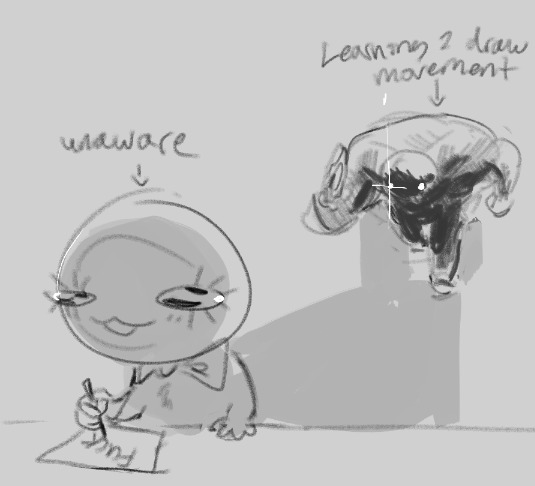
ah....!
#eeber#lol#umm. HELP!#looking at yt videos where peopel are drew scribbly rough anime fights that go fucking HARD#HOW!#u envision those poses all in your head... godg damn...#i gotta study !!!!#IGNORE MY SHIT GRAMMAR THE FOG CAME FOR ME
450 notes
·
View notes
Text
One-Page Masterlist
안녕하세요! Hey everyone! I recently got an ask about my old masterlist, which is the same as my broken-down masterlist except it has all of my lessons on one page, rather than on multiple separate posts. Some may find this expanded version easier to navigate, so I’ll keep this up for y’all! My broken-up masterlist, of course, will still be available for those who find that more helpful :)
Hangul Lessons
Consonants
Vowels
Writing/Reading Korean Syllables
Some 받침 Rules
Diphthongs
Stroke Order
Some More 받침 Rules
Irregular Verbs
The Basics
Common Phrases
Numbers
Sino-Korean vs. Native Korean Numbers (Instagram Post)
Sentence Structure and Particles
Present-Tense Conjugations and Formal Language
Adjectives
Questions
Honorifics and Casual Language
Beginner
Negative Sentences
잘 and 못
Past Tense
Future Tense (-ㄹ / 을 것이다)
-ㄹ / 을 까요? (Shall we…? / I wonder…?)
-(으)세요 (Giving Commands / Asking Questions)
Telling Time
-고 싶다 (I want to…)
How to Say “And”
-지만 (However)
아/어/여서 (So…)
Negative Commands
Spacing (띄어쓰기)
Adverbs
ㅂ Irregular
Comparatives and Superlatives
난, 날, & 내가
Upper-Beginner
-(으)면 (If…)
아/어/여도 (Even though…/Even if…)
(으)면 되다 / 아/어/여도 되다 (I can…/You may…)
-아/어도 되다: Asking for and Giving Permission (Instagram post)
-(으)면 되다 & -(으)면 안 되다 (Instagram post)
아/어/여야 되다 and 아/어/여야 하다(Have to / Should)
Present Progressive (-고 있다)
How to Say “Or”
-아/어/여하다
All About 중
How to Use -(으)로
Before & After
-ㄴ/은 채로
Intermediate
Describing Nouns with Verbs (-는 것)
Describing Nouns with Verbs - Past & Future Tense (-ㄴ/은 / -ㄹ/을 것)
Nominalization
것 같다 (I think… / It seems…)
-러 가다 / -러 오다
-(으)려고 (In order to…)
-기로 하다 (to Decide to do Smth)
척하다 (To Pretend)
-게 되다
-군요 / -구나
아/어/여 보다 (to try…)
-은/ㄴ 적 있다 / 없다 (I have / have not)
-ㄹ/을 게요 (Future Tense)
겠다
-ㄹ/을 수 있다/없다 (I can / cannot)
-ㄹ/을 때 (When…)
-ㄴ/는다면 (If)
-(으)면서 and -(으)며
-(으)니까 (Because / So)
-아/어/여주다
-(ㄴ/는)다 (Narrative Form)
Quoting
Let’s…
Quoting continued
(으)ㄹ래요? (Wanna…?)
-죠
-대로
More Quoting - 대 & 래
잘하다 & 못하다 vs. 잘 하다 & 못 하다
-아/어 가지고
-(으)려면
-는 길에 & -는 길이다
-(으)면 vs. -ㄴ/는다면 (Instagram Post)
-았/었을 것이다
-느라고
-는 데(에)
-ㄹ/을 뻔하다
Upper-Intermediate
-ㄴ/는데
-(으)ㄴ/는지 (Whether or not)
-(이)라는…
All About 아무리
-잖아요
Expressing Surprise
-시 (Honorific)
Making Comparisons
-아/어/여지다
I might…
So that…/To the point where…
Causative Verbs
시키다
Passive Verbs (part 1)
Passive Verbs (part 2)
-ㄴ/은가 보다 & -나 보다 (I guess…)
-ㄹ/을수록
Other Meanings of 싶다
-자마자 & -는 대로(As soon as…)
-긴 하다
-치고
-김에
차라리 (Rather)
-(으)ㅁ Nominalization
-기는 무슨 & -기는 개뿔
-고 보니까
-듯(이)
버리다
-(으)면 좋겠다 & -(으)면 하다
-길 바라다
Advanced
-거든(요)
-줄 알다/모르다
-ㄹ/을 테니까 and -ㄹ/을 텐데
-았/었던
아니라 and 대신에
-ㄹ/을 리가 없다
편이다, 별로, and More
-지 그렇다 (Why don’t you…?)
-ㄹ/을 걸
-ㄹ/을 까 보다
-다면서요
-다니 part 1
-다니 part 2
뜻이다 & 말이다
-다가
-더라고(요)
-더니
Some colloquialisms: 아니시에이팅 and 뭐 이렇게
-(으)ㅁ Sentence Ending
-다 보니까
What does 따위 mean?
-ㄴ/는데도
Korean Idioms
Vocabulary
Must-Know People
Must-Know Places
Must-Know Things
Must-Know Verbs
Must-Know Adjectives
Countries
Months, Days of the Week, and More
Clothing (옷)
School (학교)
Autumn (가을)
Autumn (w/Pictures!)
More Questions
House / Apartment (집 / 아파트)
Emotions / Feelings ( 감정)
Animals (동물)
Loan / Konglish Words
Food and Drink (먹을 것과 마실 것)
Parts of the Body (몸)
Counters
Modes of Transportation (교통 수단)
Colors (색깔)
Colors (with Pictures!)
Weather (날씨)
Winter (겨울)
Music & Instruments (음악과 악기)
Baking Gingerbread Cookies
Emergency (비상)
Hygiene & Bathroom (위생 & 화장실)
Indefinite Pronouns
Work / Office (일 / 사무실)
Spring (봄)
Coronavirus Prevention (코로나바이러스 방역)
How to Wash Your Hands (손을 씻기)
Time (시간)
Korean Cuisine (한식)
Summer (여름)
Summer (여름) w/Pictures!
Graduation (졸업)
Identity (독자성)
Korean Text Slang
Similar Words
Makeup w/Pictures! (화장품)
Family (with Pictures!)
Pronouns
How to Say “Still” and “Already” in Korean
Tastes & Textures (맛과 질감)
K-Pop Audition
K-Pop Fandom Terminology
Different Ways to Say “Change”
Flower Names
What Does 원래 Mean?
What does 오히려 Mean?
College
Hanja Lessons
최
수
악
식
급
동
부 & 불
애
출
퇴
예
음
중
학
습
연
생
대
입
인
문
감
과
원
특
만
후
무
Charts
Present, Past, and Future Tense
Question Words
잘 vs. 못 and Negative Conjugations
Future Tenses
-았/었던 vs. -던 (at end of lesson)
Particles
Some 받침 Rules
Gifving Commands
Conjunctions and -아/어/여서 vs. -(으)니까
-(으)면 vs. -다/라면 and Different Ways to Say “And”
How to Say “Or” (at end of lesson)
Telling Time (at end of lesson)
Comparatives and Superlatives
잘하다 & 못하다 vs. 잘 하다 & 못 하다 (at end of lesson)
Comparing 잘하다/못하다, 잘 하다/못 하다, & 수 있다/수 없다
Irregular Verbs
Pop Quizzes
Level 1
K-Pop Breakdowns
TXT - “Cat & Dog”
Twice - “Feel Special”
Enhypen - “Fever”
2NE1 - “Go Away”
Lee Hi - “Only”
“기억을 걷는 시간 (Time Spent Walking Through Memories)”
KCM - “An Old Love Story (흑백사진)”
Taeyeon - “Can’t Control Myself”
Epik High - “Lost One”
Colde - “A Song Nobody Knows”
IU - “My Sea”
Enhypen - “Polaroid Love”
유라 (youra) - “하양 (RAL 9002)″
BTS - “Ddaeng”
Stray Kids - “For You”
Woozie - “어떤 미래 (What Kind of Future)
TXT - “Eternally”
LOONA - “Heart Attack”
Stray Kids - “Muddy Water”
LOONA - “Girl Front”
Pentagon - “Daisy”
BTS - “Sea”
Semester in SK
Nami Island (남이섬)
Things to Buy at Daiso
Shopping Phrases
Ordering Coffee
Signs in Korea
Ordering at a Restaurant
Riding the Seoul Subway
Things at the 편의점
Korean Curse Words
Etiquette in South Korea
Drinking Culture
Hanja in Real Life
Holidays in South Korea
Korean Cuisine
Concert Ticketing in South Korea
K-pop Comebacks in Korea
Summer in South Korea
What I Learned
#korean#korean language#hangul#korean grammar#korean vocab#korean vocabulary#learn korean#learning korean#langblr#Korean langblr#masterlist#apok#apopofkorean#study korean#studying korean#kpop#kpop lyrics#basic korean#beginner korean#intermediate korean#advanced korean#hanja#한국어#한글#한자#한국어 공부하기#한국어 배우기#한국어 문법#한국어 어휘#초급 한국어
2K notes
·
View notes
Text
The directional "下/上/出/去/来" puzzle guide
I for one still confuse the usage of 出来 and 出去 and other similar structures so here's a guide to slightly depuzzle this puzzle.
上去 (Shàngqù): To go up and away from the speaker
下去 (Xiàqù): To go down and away from the speaker
出去 (Chūqù): To go out and away from the speaker
出来 (Chūlái): To go out and towards the speaker
上来 (Shànglái): To go up and towards the speaker
下来 (Xiàlái): To go down and towards the speaker
过来 (Guòlái): To ask someone to come over to the speaker
过去 (Guòqù): This one is tricky as it can have a few meanings so here are some random examples.
Movement away from the speaker e.g. 我来这家公司工作已经过去五年了= I have been working in this company for the past five years
Movement in time during the past e.g. 过去的年份里,公园里有很多树和花= In the past years, there were many trees and flowers in the park
Here's an illustration I made (it's been a while lol) to make it less (?) confusing:

#chinese#chinese grammar#mandarin langblr#chinese studyblr#learn chinese#studyblr#college#slavic roots western mind#student life#aesthetic#travel blog#study motivation#student#college life#study blog#langblr#language#linguistics
180 notes
·
View notes
Text
A Few Fun Little Language Learning Tips
Hello, these are a few little tips I've found on my language learning odyssey that you may find fun or helpful
Accents! This can be a great way to 'warm up' before speaking more in depth, or a training exercise, but a fun way I've found to get myself to make French sounds (it works for any language really) is to speak English (or insert native language here) with an exaggerated accent that comes from someone speaking your target language, I find this a fun way to get the sounds of a language you're trying to speak into your head in order to make speaking easier (great for speaking exam practice)
Use addictive social media for profit! So this would be best for intermediate to advanced learners, but a way to learn more slang, grow your vocabulary, and just generally get more language input in an easy way is to create a dedicated social media account in your TL and simply lurk, do you spend hours doom scrolling short form video content? Do it guilt free by doing it in your TL, do you like cat memes? read them in your TL, it's addictive, and low energy, so you can do it even when your brain feels like a fried egg
Need a pen pal? Try Ai! So, speaking to real people in your TL can be a daunting task, for reasons ranging from the fear of saying something wrong to just plain stranger danger, so a safer (and totally free) alternative can be through ai chat bots, you can do this with dedicated language learning bots or with just plain old ChatGPT
Nostalgia Bait! One of the most beautiful things about visual art is the fact that it is a universal language in itself, certain symbols can hold significance wherever you go, so re-watching animated TV shows from your childhood or watching new TV content made for kids in your TL can be a great way to add to your vocabulary, and in call & response shows, generate responses and make them more complex if you like, to add more intrigue
When in doubt, write it out! I personally struggle a lot with conjugation, so if you do to, here's a solution I found, use Quizlet learn to help drill conjugation, and when your free rounds run out, you can manually use the flash cards to use the same effective learning strategy (or pay for Quizlet plus, but I, personally would rather eat a dusty lamp then pay for something that, in my opinion, should be free to all learners)
#language#language learning#tips#grammar#langblr#french language#learning#education#language acquisition#language study#language stuff
320 notes
·
View notes
Text

Je suis obsession
Bonus: this doodle when I was listening to don mccleans Vincent 😔😔😔😔


#fun fact about me#I actually can read and understand French#but I refuse to use it correctly because I hate French#but I studied and took it for many years#so#you know#in b4 some ouiaboo is like I’m actually it’s obsede and you���d say#‘je suis obsédée’ is correct grammar : )#bitch I KNOW#hoo wee#anyways this#is quite possibly the queerest art I’ve ever drawn#vincent charbonneau#dead plate#dead plate vincent#dead plate Rody#rody lamoree#dead plate manon
87 notes
·
View notes
Text
Credit to @japanese_with_josh
I found this really helpful to hear a real life situation- not just from a textbook!
#japanese#language learning#studyblr#日本語#japan#langblr#japanese grammar#study japanese#nihongo#study#learn japanese#langblog#study kanji#travel#jlptn5#kanji#languages#language study#study abroad
661 notes
·
View notes
Text
The 6 Differences Between は and が
DIFFERENCE 1
The important fact is AFTER は
• この犬は私のベットです。This dog is my pet.
You want to emphasize that this is not a stray dog. It is not someone else's pet dog. It is MY PET. So anything comes after は is the main part you want the listener to pay attention to.
The important fact is BEFORE が
• この犬が私のベットです。This dog is my pet.
You want to emphasize that THIS IS THE DOG that is my pet. Not other dogs. Imagine you're at a park and there are 3, 4 other dogs playing together with your dog and you want to tell your friend that THIS DOG is the one that is your pet dog, other dogs are not yours. So, what comes before が is the main part you want to tell the listener.
More examples:
• このケーキはおいしいです。This cake is DELICIOUS! (You want to tell your friend that this cake is indeed very good. Your emphasis falls on おいしい, so you use は, because the important fact is AFTER は.
• このケーキがおいしいです。THIS CAKE is delicious. (You want to tell your friend that among all the cakes on the buffet table, this particular cake you are pointing to is the most delicious one. Others are not good.) Your emphasis falls on このケーキ (THIS CAKE), so you use が, because the important fact is BEFORE が.
DIFFERENCE 2
New information and things that you mention for the first time, use が. Old information or topics that have been mentioned earlier but is now repeated again, use は.
• 学校にマイクという男がいます。There is boy named Mike in my school.
You started the conversation with your friend by saying there's a new student named Mike in the school. That is the first time you mentioned Mike. It is new information, therefore use が.
• マイクはアメリカ出身です。Mike is from America.
You mention Mike the 2nd time now and it is no longer a new information. It is considered old information, therefore use は.
DIFFERENCE 3
Stating facts without adding your personal opinion or judgment use が. By adding your own opinion or judgment, use は.
• 外に猫がいます。There is a cat outside.
You are just merely stating a fact that there is a cat outside. This sentence doesn't include your description about the cat. No personal opinion or judgment about the cat.
• あの猫は白いです。The cat is white in colour.
You are putting your description, your judgment into the sentence about the cat. When you are adding your own thoughts, opinion, description about something, use は.
• 日本の料理はおいしいです。Japanese food is tasty.
You are putting your opinion/judgment about Japanese food in your sentence, therefore, use は.
DIFFERENCE 4
When you make comparison, use は. When you eliminate other options, use が.
• お茶は好きですが、コーヒーは好きじゃありません。I like tea but I don't like coffee.
DIFFERENCE 5
If two actions are done by the same person, use は. If two actions are done by two different persons, use が first, then use は for the second action.
• 私はごはんを食べるとき、テレビを見ます。I have my meal and I am watching TV.
• 私がごはんを食べるとき、父はテレビを見ます。When I have my meal, my father watches TV.
DIFFERENCE 6
To modify a phrase into a noun, use が.
• これは彼女が作ってくれたケーキです。
What cake is this? This is the cake that is baked by my girlfriend. The phrase 「彼女が作ってくれた」 is to modify the cake, to describe about the cake.
Quiz Time
• 部屋は広いです。
• 部屋が広いです。
In English, both sentences mean "The room is spacious." But what is the difference?
In 部屋は広いです, it shows a comparison contrast nuance (read DIFFERENCE 4). If you say this, the listener will believe that you are making a comparison of this room with all the other rooms in the house. You want to say this room is spacious, whereas the other rooms are smaller in size.
In 部屋が広いです, you are merely stating a general fact about this room being spacious (read DIFFERENCE 3). You are not making any comparison. Your sentence has no added personal judgement or opinion. You are stating a fact about the room being spacious.
#japanese#nihongo#studyblr#study blog#study japanese#study motivation#learning#learn japanese#language#grammar#jlpt#jlpt n5#jlpt n4#jlpt n3#jlpt n2#jlpt n1
140 notes
·
View notes
Text
psa for all avatar fanfic writers who feel the need to use Na’vi terms in their fics:
“ma” does not mean “my”
I know it’s tempting to think of it that way because it sounds similar, but it doesn’t. It’s a particle used when addressing someone directly. Think of it like a verbal @ sign. You use it when you’re talking to someone, never when you’re talking about someone.
✅ You should fix the basket, ma ‘itan.
❌ You should help ma ‘itan fix the basket.
✅ Ma Neytiri, did you go hunting earlier?
❌ I heard that ma Neytiri went hunting earlier.
Ma ‘ite = @ daughter, not “my daughter”
Ma ‘itan = @ son, not “my son”
Ma yawne = @ beloved, not “my beloved”
With ‘ite and ‘itan specifically I sometimes see it smushed into one word (ma’ite/ma’itan)--this is also incorrect. Even more so is using the tìftang as a connector between ma and whatever name or term you’re using (ma’yawne, ma’Jake, etc), which I’ve also seen once or twice. Tìftang is just a normal part of the words ‘ite and ‘itan; it has nothing to do with the “ma”.
furia aynga zola’u ne TedTalk oeyä, irayo
thank u for coming to my Ted Talk
#avatar#avatar 2#way of water#lì'fya leNa'vi#i'm sorry to be that person i knoooow it's unfair to expect the average fic author to go out of their way to study Na'vi grammar#just for a fic#buuuuuuuuuuuuuuuut it is still rather distracting ^^;#i've seen all sorts of other...um...interesting na'vi mistakes as well but this is a particularly common and easy to correct one#so#now you know :P
562 notes
·
View notes
Text
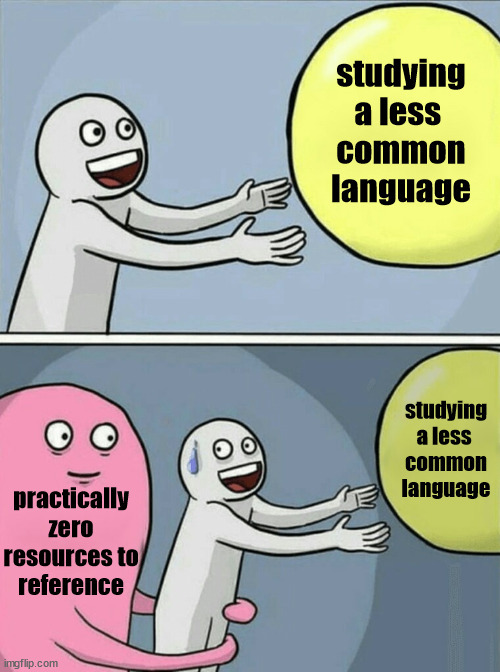
there are so many words that I have only ever heard from my professor's mouth. if he hasn't told us and it's not in the two (2) pdf sources his institution has provided, i'm fucked
#language learning#langblr#i have quite literally met and been taught by one of the people who wrote the pdf dictionary we use#i have one pdf dictionary. one workbook. and a teacher who throws out random words sometimes#if i cannot find a word or grammar concept in that. then I simply. have to figure it out if at all possible. usually not#brought to you by me doing my homework and lamenting that I can't look up a word#never before have my notes in a class been so so important#there are some words where the random sidenote I made three weeks ago is the only record of it existing#(as in. it's not in the dictionary or workbook and I can't look it up)#anyway. i love studying the language but MAN sometimes I wish there was like. a slightly easier way to double check things on my own
81 notes
·
View notes
Text
改まった形|Polite Forms
In formal settings like in a business meeting or at a public gathering some words are switched with politer forms. You often hear them when somebody is giving a speech, holding a presentation or on TV. But they appear in written form as well, especially in business context. Basically, everywhere where keigo is used, it is also expected to apply politer forms.
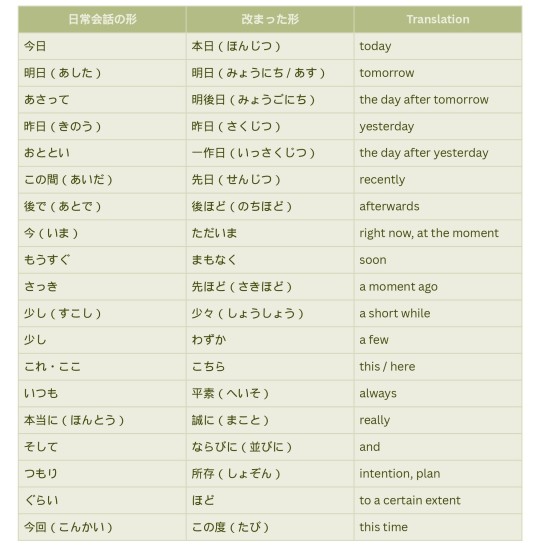
#文法#敬語#japanese langblr#langblr#studyblr#study movitation#learning japanese#japanese vocabulary#japan#japanese#study blog#study notes#language blog#keigo#japanese studyblr#japanese grammar#japanese language#日本語#日本語の勉強#nihongo
149 notes
·
View notes
Text
Y’all ever really think about how Luffy’s dream of being a pirate really developed over time? Like everyone sort of thinks he always wanted to find the one piece but I really don’t think that’s the case. I do think Luffy always wanted to be a pirate, but what that meant changed as he grew up.
Before Shanks, Luffy probably just liked the idea of being a pirate since the only other option offered in his life was the one forced upon him. To be a marine. From a very young age Luffy probably figured out he didn’t want to be a marine. Whether simply because he was a D and wanted to choose for himself or because he just hated rules that much. The logic, If I’m not a marine then I’m a pirate. Was probably what started this idea. At first being a pirate meant choice. To mot follow the boring life planned for him.
Then when he met Shanks, a real pirate, hearing tales from the sea, seeing how they acted, hearing how they lived. Becoming a pirate meant he could go on adventures. His child like understanding of the dangers plus not having to follow marine rules? That’s a dream come true for a chaotic 7yo.
But when Shanks left, this dream changed again… or well grew a new layer. While yes being a pirate meant adventure, he would also become a pirate to find the one piece to prove himself to Shanks. To show he can be a great pirate and to give the hat back. But only once he was strong enough.
Then he met his brothers. He learned the importance of freedom. What it meant to have it and what it meant to have it taken away. And obtaining the one piece no longer was just to prove himself. Because if he became king of the pirates. He would be the freest ever. It meant he didn’t have to follow marine rules. It meant he could go on adventures. It meant he could be the strongest person ever. Because he had the freedom to choose it.
And soon meeting his crew, I think being pirate king meant helping them achieve their dreams too.
#monkey d. luffy#one piece#king of the pirates#rambles#Luffy character study#luffy#straw hat luffy#headcanon#character study#red haired shanks#I love watching Luffy’s backstory cause you see how much he grows and changes#it’s subtle but it’s there#if there are any spelling or grammar mistakes suck my digital dick
91 notes
·
View notes
Text
Vocabulary: house (rooms)
2023년 9월 19일
안녕하세요!
Today, we will learn how to say each room of the house!
House: 집
Bathroom: 화장실
Dining Room: 식당
Bedroom: 침실
Kitchen: 부엌
Living room: 거실
Downstairs: 아래층
Upstairs: 윗층
Garage: 차고
Garden: 정원
#gigiskjourney#korean langblr#korean language#korean learning#korean study#korean vocab list#korean vocabulary#learn korean#learning korean#studyblr#south korea#korean grammar#korean#korea#korean study blog#study korean#studying korean#한국어
174 notes
·
View notes
Text
The 然's
突然,虽然,忽然. and the other 然's can often get mixed up, so here's a quick explanation of some of the most common ones!
突然 (Túrán): This means suddenly or unexpectedly
居然 (Jūrán): This kind of means suddenly, but more in the sense of "surprisingly" or to suggest disbelief at something that happened.
忽然 (Hūrán): This also means suddenly or unexpectedly, but it has a more stronger connotation.
既然 (Jìrán): This is a conjunction meaning "since" or "now that"
既然the weather is great, let's go out!
既然 you aren't busy, let's go watch a movie.
不然 (Bùrán): This means "otherwise" or "or else";
You should study, 不然 you won't do well on the exam.
虽然 (Suīrán): This means although or even though.
虽然 I'm not good at singing, I still like to go to the karaoke.
当然 (Dāngrán): 当然 means certainly or definitely and can be used as a reply:
Can you help me with A? 当然!
自然 (Zìrán): This can mean nature or naturally.
China's 自然 is very beautiful.
She speaks Chinese 得很自然.
仍然 (Réngrán): This can mean "still" or "yet".
I仍然 haven't read that book.
依然 (Yīrán): Similar to 仍然, this also means still" or "yet" but it's usually used in more formal and literary works, whereas 仍然 is more often used in spoken language.
果然 (Guǒrán): 果然 can be used to mean "indeed" or "as expected"
This movie is 果然 interesting.
竟然 (Jìngrán): This is an adverb used to suggest surprise or something unexpected.
He竟然forgot her birthday.
显然 (Xiǎnrán): This means "clearly" or "obviously".
This soup 显然 hot.
偶然 (Ǒurán): This means "accidentally" or "by chance".
We 偶然 met at the same cafe.
How many other 然's do you know about? Drop a comment!
#slavic roots western mind#student life#student#study blog#college#college life#travel blog#aesthetic#studyblr#study motivation#chinese#china#study in china#life in china#learn chinese#chinese grammar#grammar#vocabulary#chinese vocabulary#chinese verbs#verbs#verb#chinese studyblr#mandarin langblr#mandarin#mandarin chinese#chinese language#language learning#chinese langblr#language resources
62 notes
·
View notes
Text
Pitch, Please Pt. 1 [new series alert]
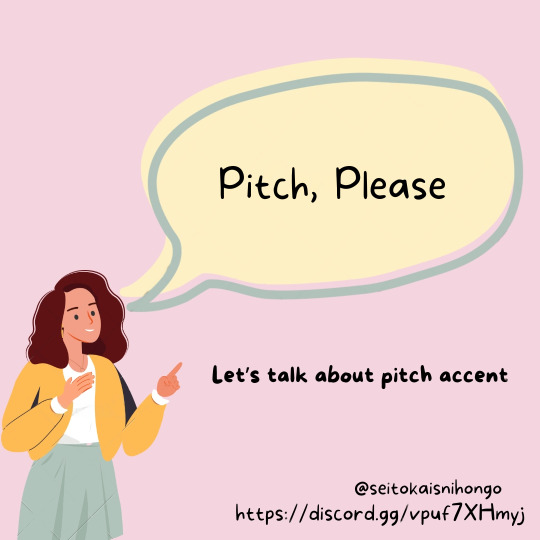
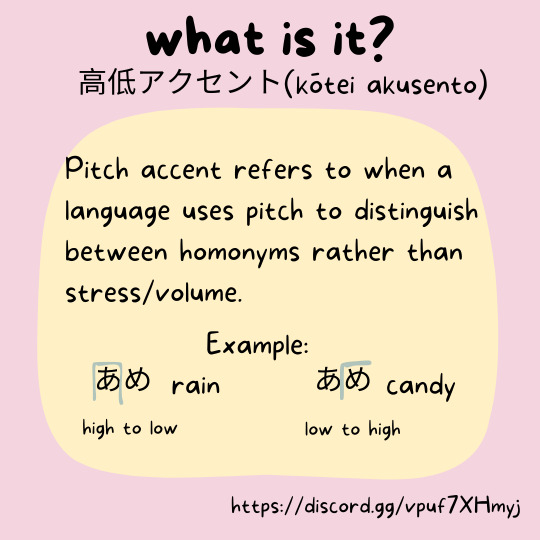
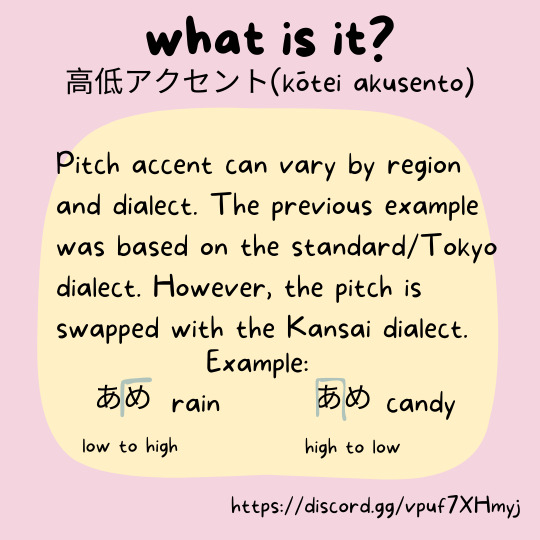
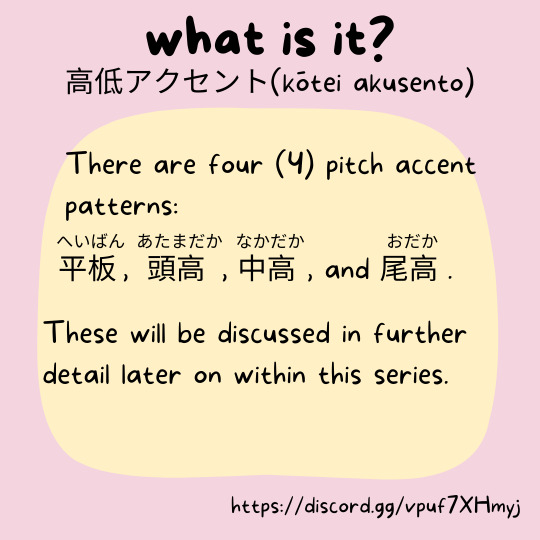

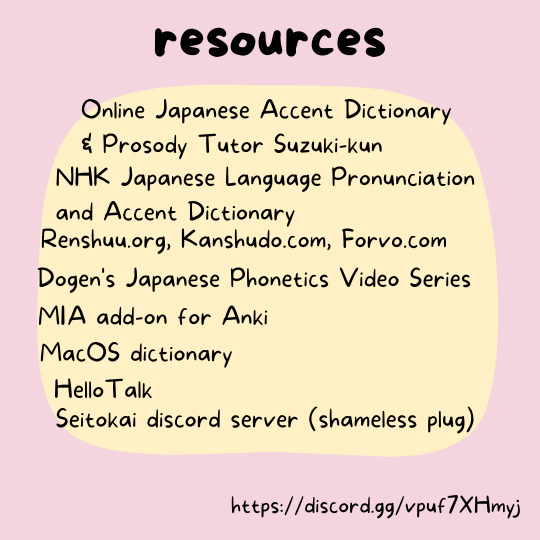

This was launched on the Seitokai IG (seitokaisnihongo). Keep reading this post to get information that is written on the graphics (and the IG caption).
This is a new series that I've been working on for a bit! It'll be discussing pitch accent, dialects, listening comprehension, and anything else that may fall within that category.
If there's a particular dialect that you'd like for us to cover in this series, feel free to stick it in the reblogs, my inbox, my asks, on the Seitokai instagram, or the Seitokai discord server!
Without further ado, here is what the posts say above!
Pitch, Please! Let's talk about pitch accent.
What is it?
Pitch accent, known as 高低アクセント(kōtei akusento) in Japanese, refers to when a language uses pitch to distinguish between homonyms rather than stress/volume. For example: あめ, meaning rain (high pitch to low) vs あめ, meaning candy (low pitch to high pitch).
Pitch accent can vary by region and dialect. The previous example was based on standard/Tokyo dialect. However, the pitch accent is swapped with the Kansai dialect. あめ, meaning rain goes from low pitch to high and あめ, meaning candy goes from high pitch to low.
There are four (4) pitch accent patterns: 平板 (へいばん), 頭高 (あたまだか), 中高 (なかだか), and 尾高 (おだか). These will be discussed in further detail in a later post within this series.
How to work on it?
Listen to native speakers (podcasts, news channels, videos, etc.)
Converse with native speakers (if possible)
Mimic the correct pronunciation
Be willing to ask for help and accept correction
Resources
Online Japanese Accent Dictionary & Prosody Tutor Suzuki-kun
NHK Japanese Language Pronunciation and Accent Dictionary
Renshuu.org, Kanshudo.com, Forvo.com
Dogen's Japanese Phonetics Video Series
MIA add-on for Anki
MacOS dictionary
HelloTalk
If you're looking for fellow learners, there are over 500 of us in the Seitokai discord server (shameless plug) and we'd love to have you!
#japanese#learn japanese#study japanese#pitch accent#japanese dialects#japanese grammar#kanji#vocab#jlpt#reading practice#listening comprehension#reading comprehension#shay's back with another post#pitch please#linguistics#seitokai#grammar
233 notes
·
View notes
Text
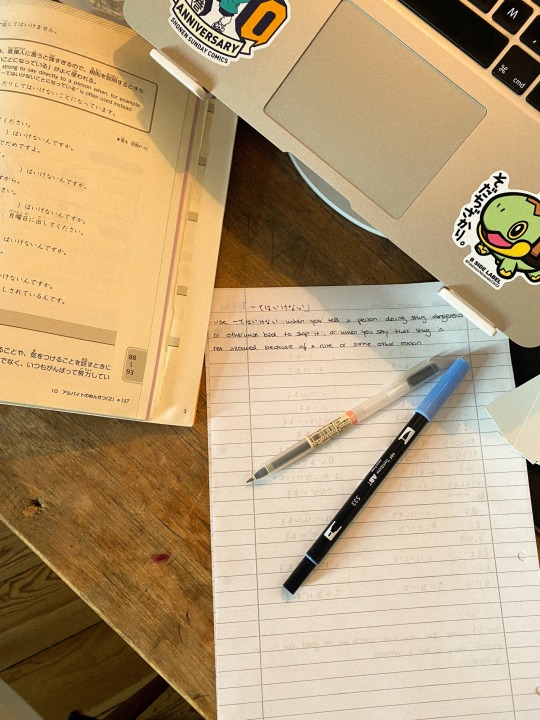



studied some japanese grammar for the first time in a while and made cinnamon rolls 📖🥮
#studyblr#studyspo#studying#university#student#college#study motivation#japanese#japanese langblr#langblr#notes#grammar#dark academia#fall#autumn#cozy#desk inspo
1K notes
·
View notes